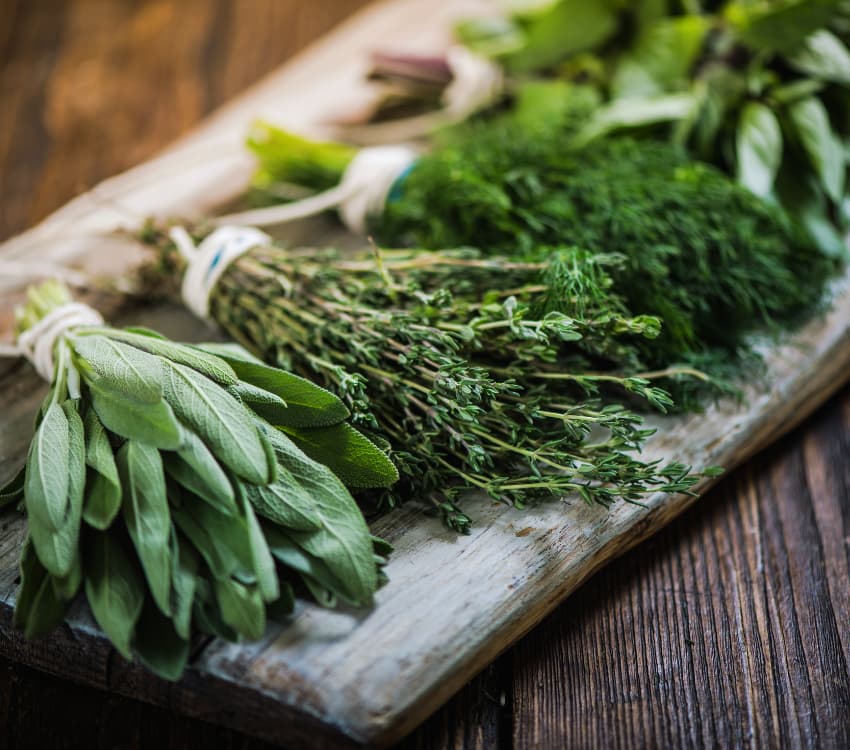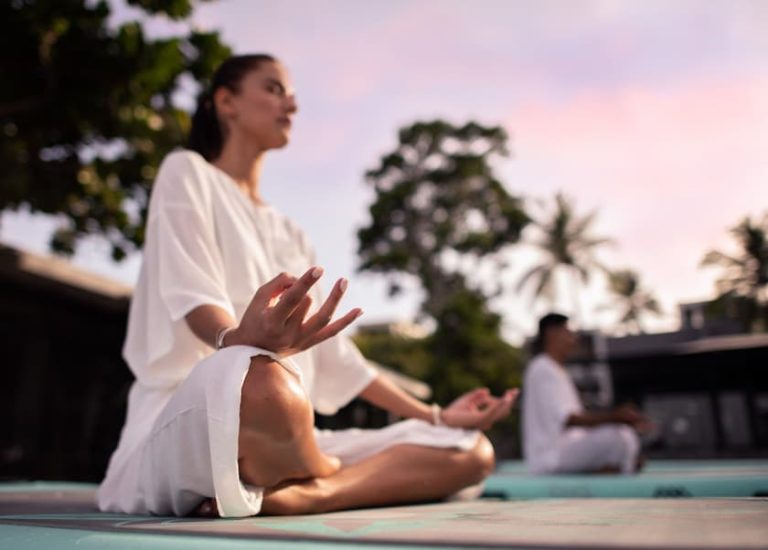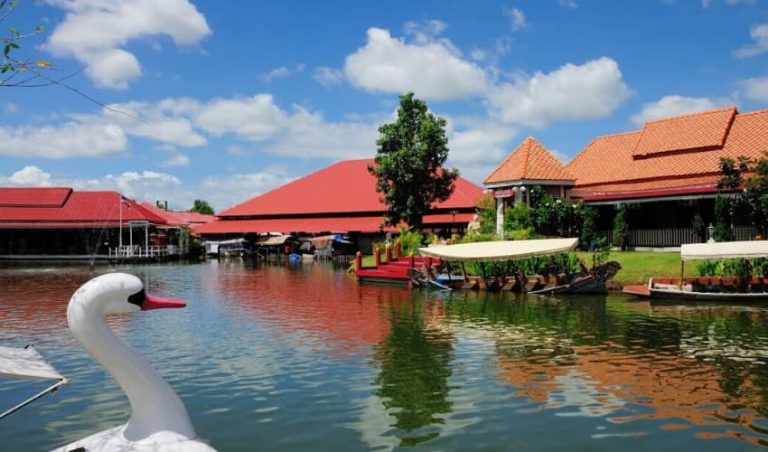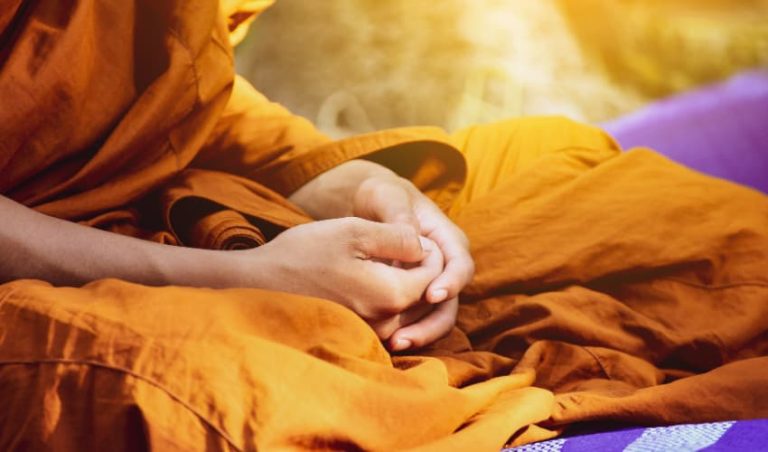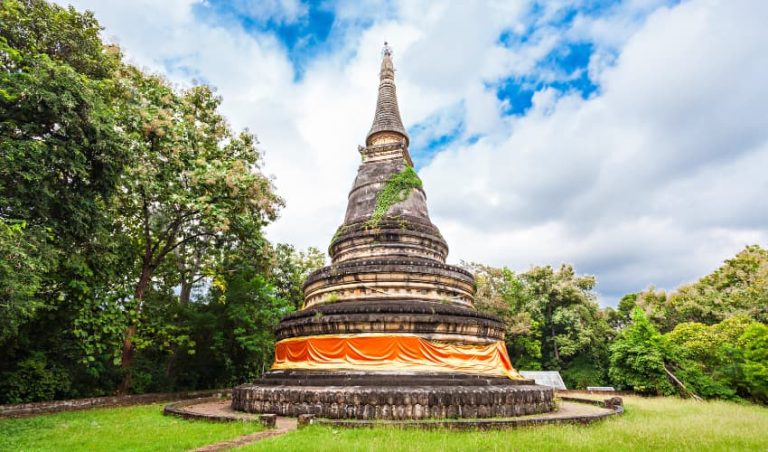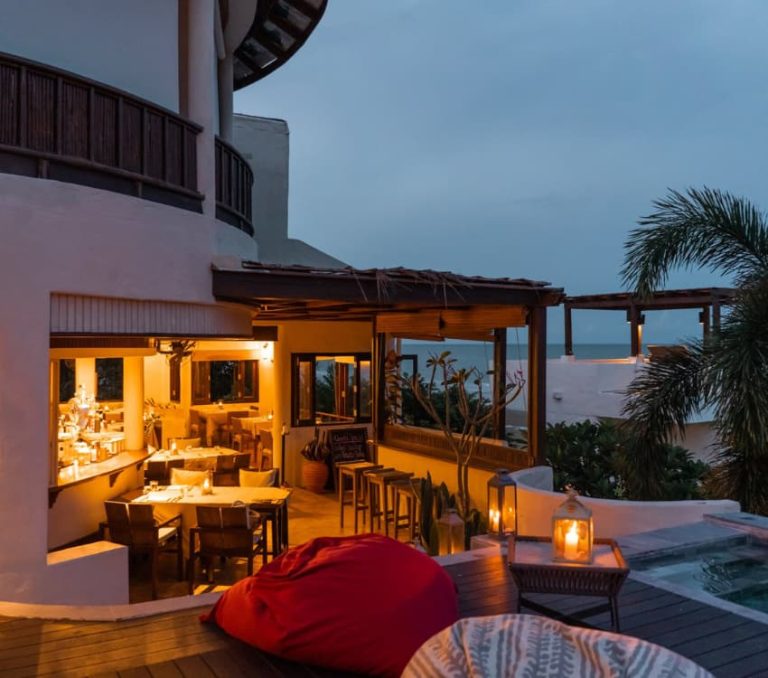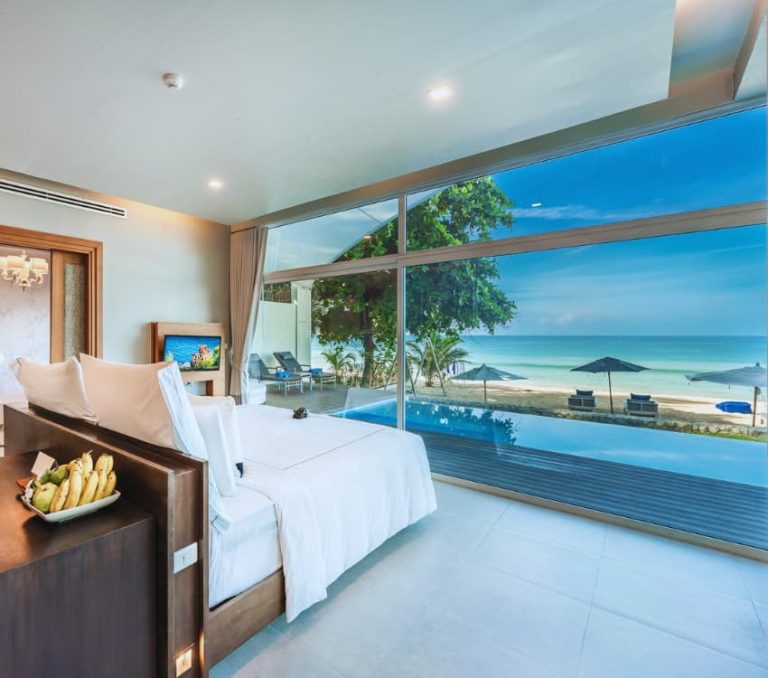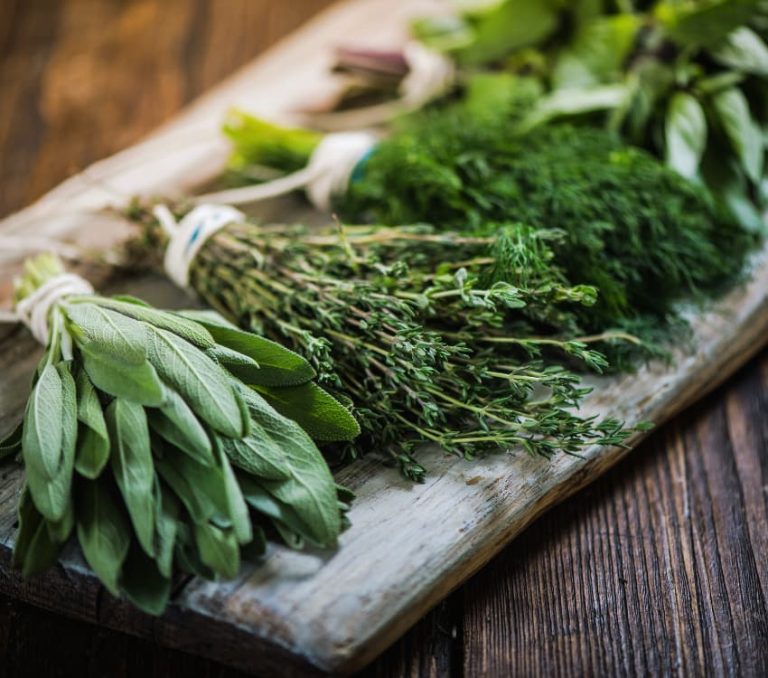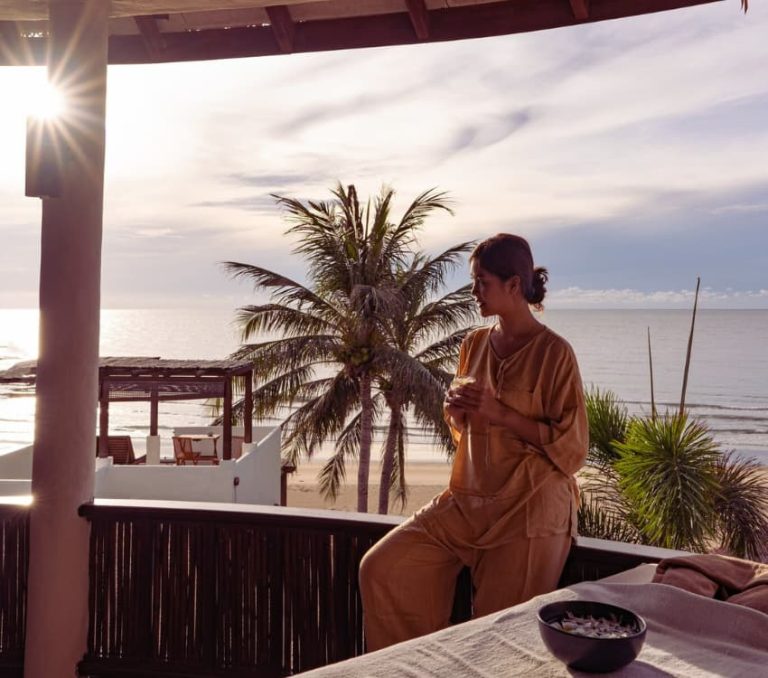In Thailand, herbs are more than just ingredients; they are an integral part of everyday living, woven into meals, remedies, and ancient wellness practices. From local morning markets to steaming herbal compresses at Ayurah Spa, herbs play a role in helping both body and mind find balance.
At Aleenta Hua Hin – Pranburi Resort & Spa, this connection to nature is woven into everything we do. Our retreat was created with the understanding that wellness is not something separate from daily life. It is found in the food we share, the air we breathe, and the rituals that help us feel grounded and restored.
Herbs in Daily Thai Life
In Thailand, herbal knowledge is passed from generation to generation, rooted in folk wisdom and refined through years of use. Many of the herbs used today serve not only as a flavouring agent but also carry healing properties that support digestion, circulation, skin health, and immunity. It is common for the same plant to appear in both a soup and a remedy, showing just how intertwined nourishment and wellness truly are.
Some of the most widely used herbs include:
- Sweet basil (horapa) and holy basil (kaprao) are two varieties that differ from Western basil. Sweet basil has a gentler aroma and is used in curries and stir-fries, while holy basil brings a peppery heat and is often added to spiced meat dishes. Additionally, holy basil is believed to have properties that support the stress response and heart health.
- Lemongrass (takrai) grows in tall stalks and brings a citrus fragrance that is instantly recognisable. It is known for its ability to ease digestion and calm bloating, and is often brewed as tea or used in soups and curry pastes.
- Galangal (kha) is related to ginger but has a sharper flavour with a hint of pepper. Young galangal is used in soups like Tom Kha, while mature roots are more suitable for curry pastes. It is also known to relieve stomach pain and nausea.
- Finger root (krachai), sometimes called lesser galangal, is often used with seafood and helps reduce flatulence and indigestion. It is recognisable by its knobbly shape and earthy flavour.
- Ginger (khing) plays a major role in both food and traditional medicine. It helps to warm the body, ease cold symptoms, and stimulate the appetite. You will find it in teas, marinades, stir-fries, and even desserts.
- Bean sprouts (thua ngok) are often served raw as a crunchy topping for noodles and soups. They are packed with nutrients such as vitamin C, calcium, and potassium, which support strong bones and overall energy levels.
- Lotus root (raug bua) grows beneath the surface of still waters and is valued for its mild coconut-like flavour. It is rich in fibre and is used in both savoury dishes and desserts.
- Taro root (puak) has a dense texture similar to potato but with a slightly sweeter, nuttier taste. It is used in snacks and sweets and provides slow-releasing energy and dietary fibre.
- Mint (saranae) brings a cooling effect to salads, teas, and herbal drinks. It supports digestion and also lifts energy and mental clarity.
- Turmeric (khamin) is a powerful anti-inflammatory herb. It is widely used in marinades and curry pastes and is also made into a healing paste for external use on the skin.
- Bay leaves (bai krawan) in Thai cuisine are not identical to their Western counterpart. These leaves are used to flavour soups and are sometimes steeped as a tea to support blood sugar balance.
- Cardamom (look krawan) adds depth to sweet and savoury dishes. It supports digestion, improves blood circulation, and is often used in teas and herbal compresses.
- Coriander (phak chi) is used in its entirety. The roots are crushed into curry pastes and marinades, the leaves garnish soups and salads, and the seeds are ground for spice blends. It is known for its cleansing properties and is often used to support detoxification.
Each of these herbs carries not only its unique flavour, but also a specific benefit to the body, mind, or both. At Aleenta Hua Hin, they are used thoughtfully in our kitchens, spa, and wellness spaces to help you reconnect with the healing gifts of the natural world.
Food as Medicine
In Thai cooking, herbs are never added without purpose. Every recipe reflects a careful balance of taste and benefit. Meals nourish the body and also help it to stay in balance. At Aleenta Hua Hin, we use this understanding to craft menus that are both satisfying and supportive of wellbeing.
Many herbs assist digestion, boost immunity, and ease internal inflammation. Dishes like green curry or Tom Yum Gung do more than delight the palate; they are warming, cleansing, and gently therapeutic. Ingredients like galangal and ginger stimulate circulation and can help reduce nausea or bloating. Turmeric is a potent anti-inflammatory and supports joint health. Coriander and lemongrass help rid the body of toxins and improve gut function.
Tom Yum Gung, the classic Thai hot and sour soup, is a favourite at our resort. Beyond its fragrant aroma and rich taste, it contains compounds now studied for their ability to help protect against cancer. With lemongrass, galangal, kaffir lime leaves, and coriander all working in harmony, it offers an impressive combination of flavour and function.
Dining at Aleenta is thoughtfully prepared, utilising ingredients that are seasonal, local, and naturally rich in nutrients. Whether you’re enjoying breakfast at our beachfront café or a leisurely lunch with your feet in the sand, you’re being nourished in ways that extend beyond the plate.
Healing Through the Skin
Herbs have long been used in topical applications to heal and protect the skin, support circulation, and ease muscle tension. In Thailand, external treatments are a trusted way of caring for the body and calming the senses.
At Ayurah Spa, we prepare herbal compresses made with turmeric, ginger, lemongrass, kaffir lime and camphor. These herbs are steamed to release their essential oils, then gently pressed onto the body to encourage blood flow and relieve pain. The heat helps the skin absorb the herbs more deeply, offering both comfort and therapeutic benefits.
We also use traditional herbal pastes and scrubs, made from fresh or dried plants blended with natural oils. Turmeric is applied to reduce irritation, while lemongrass extract can improve scalp health. Treatments are tailored to your body’s specific needs and are an integral part of the natural healing experience available at our resort.
Steam bathing is another gentle therapy that uses herbs. In Thai tradition, herbs are placed in a pot beneath the steam source. As the steam rises, it draws out the essence of the plants. Guests sit or lie in the herbal mist, allowing their skin to absorb the oils while their body relaxes and releases tension.
Scents That Soothe and Support
Aromatherapy is not just about fragrance in Thailand. It is a form of care. Scents have a profound effect on the nervous system, and Thai herbal blends are often created to lift energy, ease fatigue, or promote calmness and focus.
At Aleenta, you may notice mint and kaffir lime in herbal teas, lavender in your room, or lemongrass carried on the breeze from the spa. Mint is known for sharpening the senses and relieving headaches. Cardamom is warming and is used to reduce feelings of sadness. Lavender is a natural support for sleep and helps lower the heart rate.
Inhalers and oil blends are also commonly used in Thai wellness, particularly during treatments or meditations. These small tools offer a quick way to regain clarity, focus the mind, or gently release stress.
Herbal scents are used throughout our retreat, in ways both subtle and intentional. Every scent is chosen to enhance your sense of presence, relaxation, and ease.
The Wisdom of Thai Massage
Nuad Boran, also known as traditional Thai massage, is a centuries-old system of movement, pressure, and breath. It is a full-body experience that engages the muscles, joints, and energy lines of the body, often referred to as Sen Sib.
At Aleenta Hua Hin, we honour this practice in our spa rituals, combining traditional movements with the use of steamed herbal compresses. These compresses are made from herbs selected for their ability to reduce swelling, relieve pain, and support circulation.
The massage itself involves stretches and applied pressure to specific points along the body, encouraging blocked energy to flow more freely. Unlike Western styles of massage, Thai massage is often an active experience, with the therapist using hands, elbows, knees, and even feet to guide the session.
The result is not just physical relief. Thai massage also creates space for emotional release, mental clarity, and energetic balance. At Ayurah Spa, the experience is further enhanced with focused breathing, soft lighting, and a deep respect for the guest’s state of being.
Aleenta is Your Place to Feel Well Again
Wellbeing is not something to chase. It is something to return to. At Aleenta Hua Hin – Pranburi Resort & Spa, you will find space to do just that. Whether you are walking along the coastline, cycling at sunrise, or sharing a quiet breakfast overlooking the sea, everything invites you to slow down and reconnect.
Our wellness retreats are built on the same foundations as Thai herbal traditions. You can choose from active programmes, nature-inspired stays, or quiet restorative days. Each is guided by the same intention: to support your body, uplift your mind, and offer the nourishment of simple, natural living.
Herbs are more than ingredients here. They serve as reminders, reminding us of the body’s wisdom, of nature’s generosity, and of the profound healing that comes from returning to what feels natural and whole.
Related Articles
- Holistic Herbal Holidays in Hua Hin
- Digital Detox for Your Health in Pranburi
- Detoxify and Revive Your Body in Pranburi
- Seven Unique Experiences in Pranburi
- Healing Massage Therapy in Pranburi
Aleenta Hua Hin
Pranburi Resort & Spa
Pranburi Resort & Spa

